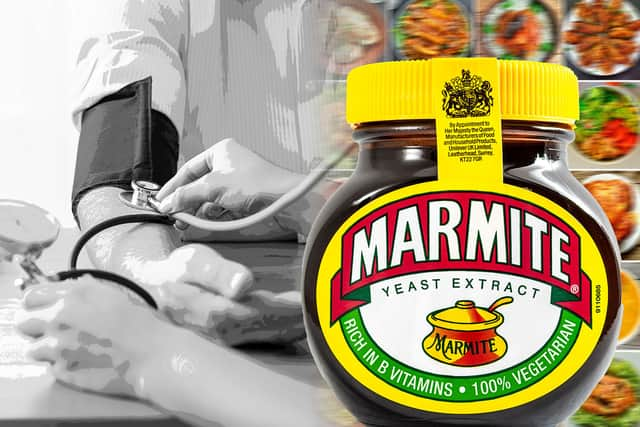Eating Marmite ‘more important than reducing salt’ to lower blood pressure, ZOE Health Study finds
and live on Freeview channel 276
Eating potassium-rich foods such as Marmite is “more important” in lowering blood pressure than cutting out salt, a new study suggests.
Researchers from the ZOE Health Study found that people with a lot of potassium in their diet have lower blood pressures and eating certain foods can be beneficial in keeping blood pressure under control.
Advertisement
Hide AdAdvertisement
Hide AdThe ZOE team asked 96,000 people to take part in its Big Diet Study which aims to understand how diet is linked to the development of various diseases, such as cancer and heart disease, as well as how what we eat affects our blood pressure.
The study identified several health and diet factors that affect blood pressure, with the following all contributing to higher blood pressure levels :
- if you have been diagnosed with hypertension
- your age
- your BMI
- drinking alcohol
- smoking
Many of these factors cannot be controlled, but reducing the amount of alcohol you consume, cutting out smoking and being more physically active can all be beneficial in lowering blood pressure.
But perhaps the most interesting finding of the study centres around potassium. Researchers found that having a high amount of potassium in your diet leads to lower blood pressures, and this is actually more important for controlling high blood pressure than cutting out salt.
Advertisement
Hide AdAdvertisement
Hide AdProfessor Tim Spector, Professor of Genetic Epidemiology at King’s College London and lead scientist on the ZOE Health Study, explained in an update on the research on YouTube: “People who have a lot of potassium in their diet have lower blood pressures and studies have shown this is more important than salt - when you add potassium supplements rather than reducing salt.
“This is actually quite a major finding because this is something all of you can do. You can actually improve the potassium in your diet.”


Can eating Marmite help lower blood pressure?
Prof Spector went on to identify a list of foods that are high in potassium, including some surprising items.
Yeast extract - such as Marmite - topped the list of potassium-rich foods, with the study showing it contains more than 2,000 mg of potassium per 100g. This was followed by potato crisps, tomato puree and protein powder shake.
Advertisement
Hide AdAdvertisement
Hide Ad“Looking at foods that contain high potassium, many of which I didn’t know about - I thought it was just bananas which tennis players eat - but it turns out that the top 15 ones are things like yeast extract, which vegans use to mimic cheese, potato crisps - now that’s an unlikely one,” Prof Spector said.
“If they are fired in sunflower oil which most of them are, then good quality potato chips have a lot of potassium. Obviously they have a bit of salt in them, but if we think potassium is more important that is really interesting.
“Tomato purees, power shakes, pistachio nuts - again a really good source of potassium, as well as coffee whitener - interestingly - and dried raisins, dried fruits, prunes, pumpkin skins and quinoa.
“So a very diverse list of things you probably hadn’t thought about, but it just makes people think differently. But generally most plants, vegetables and fruits do have pretty good levels of potassium in there.”
Advertisement
Hide AdAdvertisement
Hide AdThe top 15 food containing potassium (per 100mg), according to ZOE are:
- Yeast extract (like Marmite)
- Potato crisps
- Tomato puree
- Protein powder shakes
- Roasted pistachio
- Coffeemate whitener powder
- Dried raisins
- Dried mixed fruit
- Prunes
- Pumpkin seeds
- Raw quinoa
- Bombay mix
- Fresh parsley
- Breakfast bran cereal
- Almond butter
The NHS says high blood pressure is considered to be from 140/90mmHg (or an average of 135/85mmHg at home) – or 150/90mmHg (or an average of 145/85mmHg at home) if you are over the age of 80.
A blood pressure reading between 120/80mmHg and 140/90mmHg could mean you are at risk of developing high blood pressure if you do not take steps to keep it under control.
All adults over the age of 40 are advised to have their blood pressure checked at least once every five years as part of an NHS Health Check. You can also get tested at your GP surgery, some pharmacies, or in some workplaces.
Comment Guidelines
National World encourages reader discussion on our stories. User feedback, insights and back-and-forth exchanges add a rich layer of context to reporting. Please review our Community Guidelines before commenting.
